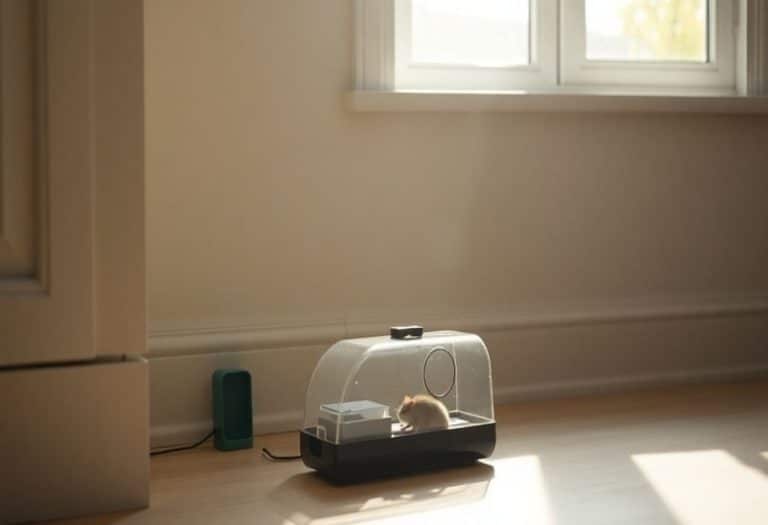Mice in London? They’re not just random visitors. Understanding their behavior is key to keeping them out.
Why Mice Are Attracted to Your Property
It’s simple: mice want food, water, and shelter. Your home offers all three. They’re not picky; crumbs, leaky pipes, and cozy corners are all invitations.
Mice are opportunistic. They’ll exploit any weakness in your defenses.
London homes, with their varied architecture, can be especially vulnerable.
Common Entry Points for Rodents
Think small. Mice can squeeze through tiny gaps. Cracks in foundations, spaces around pipes, and even unsealed windows are highways for rodents.
They’re also climbers. Vines, trees, and even drainpipes can act as ladders. Regular maintenance is crucial.
Don’t forget about shared walls in terraced houses. Mice can easily travel between properties.
Signs of a Mouse Infestation
Droppings are a dead giveaway. Look for small, dark pellets in drawers, under sinks, and along baseboards. These are often the first sign.
Listen for scratching noises, especially at night. Mice are nocturnal and active when you’re trying to sleep. You might also find gnaw marks on food packaging or furniture.
Check for nests. Mice like to build them in hidden, undisturbed areas using shredded paper, fabric, or insulation. The presence of a mouse is a sign of infestation.
Effective Prevention Strategies for London Residences
Mice are a common problem in London homes, but there are steps residents can take to prevent infestations. Prevention is key to keeping these pests away.
Securing Your Home’s Exterior
Seal any cracks or holes in the foundation and walls. Mice can squeeze through surprisingly small openings. Inspect your home regularly for potential entry points.
Install door sweeps on exterior doors. This prevents mice from sneaking in under the door. Also, check and repair any damaged window screens.
Trim vegetation away from the house. Overgrown bushes and trees can provide easy access for mice to climb onto your roof or into windows.
Maintaining a Clean and Tidy Environment
Cleanliness is crucial in preventing mouse infestations. Mice are attracted to food debris and clutter. A clean home is less appealing to them.
Regularly sweep and vacuum floors to remove crumbs and spills. Wipe down countertops and clean under appliances. Don’t give them a reason to stick around.
Declutter your home to eliminate hiding places for mice. Get rid of cardboard boxes and piles of paper. Store items in sealed plastic containers.
Proper Food Storage and Waste Management
Store food in airtight containers to prevent mice from accessing it. This includes pet food, which can be a major attractant. Proper food storage is a big part of prevention.
Keep garbage cans tightly sealed and dispose of waste regularly. Don’t let trash accumulate inside or outside your home. Mice love garbage.
Clean up any food spills immediately. Even small amounts of food can attract mice. A little bit of effort goes a long way.
Safe and Humane Mouse Removal Methods
Utilizing Break-Back Traps Effectively
Break-back traps offer a quick solution. Placement is key for success. Use bait like peanut butter or chocolate.
Set traps along walls or in areas with mouse activity. Check traps regularly and dispose of mice properly. These traps are considered more humane than glue traps.
Consider the safety of pets and children when placing traps. Keep them out of reach to prevent accidents.
The Role of Live Traps and Their Limitations
Live traps capture mice without harming them. Relocation is necessary after capture. Choose a location far from your home.
Live traps require frequent monitoring. Mice can suffer if left too long without food or water. These traps are a humane option, but require commitment.
Consider the local ecosystem before releasing mice. Introducing them to unfamiliar environments can be harmful.
Live traps are a good option if you want to avoid killing mice. However, they require more effort and consideration than other methods.
Natural Deterrents and Repellents
Certain scents deter mice. Peppermint oil and mothballs are common choices. Place them near entry points.
Maintain a clean home to reduce attractants. Remove food sources and nesting materials. Prevention is key to long-term mouse control.
Consider natural predators like cats. They can help keep the mouse population down. However, ensure responsible pet ownership.
When to Call a Professional London Mouse Exterminator

Challenges of DIY Mouse Control
DIY mouse control can seem appealing, but it often falls short. Mice are adaptable and breed quickly, making them tough to eliminate without proper tools and knowledge. Many homeowners find themselves in a frustrating cycle of temporary fixes.
Amateur products are often less potent than professional-grade solutions. This can lead to mice developing resistance, making future control even harder. Plus, improper use of traps or poisons can pose risks to pets and children.
Ultimately, DIY methods can be time-consuming and ineffective. If you’re not seeing results quickly, it’s time to consider a professional London mouse exterminator.
Access to Professional-Grade Rodenticides
Professional pest control services have access to stronger, more effective rodenticides. These products are not available to the general public due to safety regulations and the need for specialized training.
London mouse exterminators are trained in the safe and strategic use of these chemicals. They know how to apply them effectively while minimizing risks to non-target animals and humans.
Using professional-grade rodenticides can significantly speed up the elimination process. It ensures that the mouse population is dealt with thoroughly and efficiently.
Expertise in Addressing Resistant Mouse Populations
Mice in London have, in many cases, developed resistance to common rodenticides. This is a significant challenge for DIY efforts, as over-the-counter products may simply not work.
A professional London mouse exterminator understands this resistance. They can employ strategies like bait rotation and alternative treatment methods to overcome it.
They also have the experience to identify the specific species of mouse infesting your property. This allows them to tailor their approach for maximum effectiveness.
Addressing Odor and Post-Extermination Issues
Dealing with Deceased Rodents
Okay, so you’ve gotten rid of the mice. Great! But what if some of them, you know, didn’t make it out? Finding a dead mouse isn’t fun, but it’s gotta be done. The big thing is location. Check common hiding spots. Think dark, quiet places. Under appliances, in walls, or in the attic are prime real estate for deceased rodents.
Once you find one, gloves are your best friend. Double bag it, and toss it in an outside bin. Don’t forget to disinfect the area. You don’t want any lingering germs or smells.
If the smell is strong, it might be in a wall. That’s a job for a pro. They have tools and tricks to deal with it without tearing your house apart.
Eliminating Lingering Odors
Mouse odors are the worst. They can stick around long after the mice are gone. It’s not just unpleasant; it can attract other pests. So, what can you do?
First, air out the place. Open windows and let fresh air circulate. Next, clean everything. Use a good disinfectant on surfaces where mice were active. Don’t forget carpets and upholstery.
Baking soda is your friend. Sprinkle it on carpets, let it sit, then vacuum. For tough smells, consider an enzymatic cleaner. These break down the source of the odor. If the odor persists, consider professional help. They have specialized equipment to eliminate even the most stubborn smells.
Preventing Future Infestations
So, you’ve dealt with the dead mice and the smells. Now, how do you make sure they don’t come back? Prevention is key. Seal up any entry points. Check around pipes, windows, and doors. Use caulk or steel wool to fill gaps.
Keep your place clean. Mice are attracted to food. Store food in airtight containers. Clean up spills right away. Don’t leave food out on counters.
Finally, consider professional pest control. They can offer ongoing monitoring and treatment. This can help prevent future infestations. Plus, they know how to handle resistant mouse populations. It’s an investment in a mouse-free future.
Long-Term Solutions for Mouse-Free Living
Continuous Monitoring and Maintenance
Keeping mice away for good means staying vigilant. Regular checks around your property are key. Look for any new signs of mouse activity, like droppings or gnaw marks.
Address small issues before they become big problems. Seal up any new cracks or holes you find. This proactive approach can save you a lot of trouble down the road.
Don’t forget about the outside of your home. Keep bushes trimmed and clear away any debris that could provide shelter for rodents.
Implementing Integrated Pest Management
Integrated Pest Management (IPM) is a smart way to handle pests. It focuses on preventing problems instead of just reacting to them. IPM uses a mix of strategies, like sealing entry points and managing food sources.
IPM also considers the environment and uses the least harmful methods possible. This means avoiding harsh chemicals when you can. Natural deterrents and traps can be effective parts of an IPM plan.
Think about working with a pest control pro to create an IPM plan for your home. They can assess your specific needs and recommend the best approach.
Benefits of Professional Pest Control Contracts
Hiring a pest control company can give you peace of mind. They can provide regular inspections and treatments. This helps keep mice away long-term.
Professionals have access to tools and products you can’t get on your own. They also know how to handle tough infestations. A pest control contract can be a good investment.
A professional pest control service can offer tailored solutions and ongoing support, ensuring your home remains a mouse-free zone. They can also identify and address underlying issues that attract rodents in the first place.
Wrapping Things Up
So, there you have it. Getting rid of mice in your London home doesn’t have to be a huge headache, and you definitely don’t need to mess up your place in the process. It’s really about being smart and consistent. Start with those simple prevention steps, like keeping things tidy and sealing up any little gaps. If you do find yourself with some unwanted guests, remember there are lots of ways to deal with them without resorting to harsh chemicals or anything that could damage your home. Sometimes, a good old trap works wonders, or maybe even calling in a pro if things get a bit out of hand. The main thing is to tackle the problem head-on and keep an eye out for any signs of them coming back. You got this!


